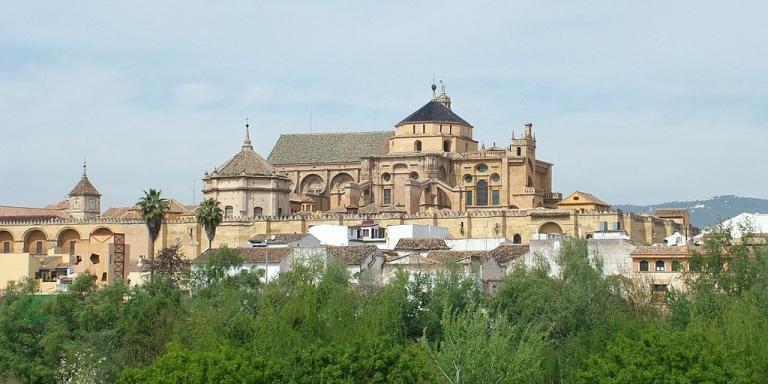
Here’s a piece that my friend Bill Hamblin and I published in the Deseret News back on 28 November 2015:
The Spanish city of Córdoba powerfully reminds us that Judaism, Christianity and Islam haven’t always been at war.
Nestled beneath the Sierra Morena mountains in a region called Andalucía, the Roman settlement of Corduba was founded in 206 B.C. on the northern bank of the Guadalquivir River (from Arabic “al-wadi al-kabir,” meaning “the big riverbed”). Rich agricultural lands stretching southward produce wheat and olives in abundance.
From its earliest days, Córdoba played a significant role in history. In 45 B.C., Julius Caesar is said to have killed many in the city because of their opposition to him in the Roman Civil War. On a more positive note, the Stoic philosopher, statesman and dramatist Seneca was born in Roman Corduba around 4 B.C., and his nephew Lucan, among the greatest Latin poets, was born there in A.D. 39. Unfortunately, both Seneca and Lucan were accused of conspiracy against the tyrannous Emperor Nero in A.D. 65 and forced to commit suicide — about the time that Nero executed the apostles Peter and Paul. (Lucan was just 25 years old.)
With the decline and fall of Rome, Córdoba was virtually destroyed in the fifth century by barbarian attackers from the north. Conditions improved only when Arabs invaded from North Africa in A.D. 711, ousting a weakened Visigothic monarchy. A Catholic church dedicated to St. Vincent stood in the city at the Muslim conquest; under the terms of surrender, Muslim and Christian worshipers shared the building.
The city’s importance surged when the imperial Umayyad dynasty in Damascus was overthrown in 750 by the Abbasid Revolution. The last survivor of the Umayyads, Abd al-Rahman I, made his way to Spain, where he founded an independent emirate and, in 756, made Córdoba his capital. Eventually, he purchased the Christian half of St. Vincent’s church, paying a generous sum and permitting Córdoba’s Christian community to build other churches elsewhere. Then he razed the church and, in its place, began to construct the Great Mosque of Córdoba — an iconic building that still stands today as a remarkable monument of Spanish and Islamic architecture. (After Christian forces took the city as part of the Spanish Reconquista in 1236, though, it was converted into a cathedral.)
But Córdoba’s most remarkable contributions to world culture have been literary and philosophical, extending long after Seneca and Lucan.
Born in Córdoba in 994, Ibn Hazm ranks among the most prolific authors in the history of Islamic civilization, making important contributions in jurisprudence, medicine and science. He’s most famous, though, for a treatise on love titled “The Dove’s Neckring” and for a path-breaking work that made him, arguably, the founder of the study of comparative religions. And he also wrote on ethics. For example, his book “In Pursuit of Virtue” advises his readers, “Do not use your energy except for a cause more noble than yourself. Such a cause cannot be found except in Almighty God Himself: to preach the truth, to defend womanhood, to repel humiliation that your creator has not imposed upon you, to help the oppressed. Anyone who uses his energy for the sake of the vanities of the world is like someone who exchanges gemstones for gravel.”
More illustrious still, however, are the two native Córdobans Ibn Rushd (born 1126) and Musa b. Maymun (born 1135 or 1138), also known, respectively, as Averroes and Moses Maimonides. The first, a Muslim jurist and philosopher, may still count as the greatest commentator on Aristotle; the Christian poet Dante honored Averroes by placing him in the highest circle of hell, along with Plato, Aristotle, Virgil and Homer — whose only sin was being unbaptized.
The physician, rabbi and philosopher Moses Maimonides is widely considered the greatest Jewish thinker of the Middle Ages. His 14-volume “Mishneh Toreh” holds significant authority still today as a codification of rabbinic law, and his “Guide of the Perplexed,” written in Arabic, is perhaps the most important single book of Jewish philosophy. “From Moses (of the Bible) to Moses (Maimonides),” goes an old Jewish saying, “there was none like Moses.” (Brigham Young University’s Middle Eastern Texts Initiative has published dual-language editions of several books by the two eminent writers.)
Averroes and Maimonides influenced not only subsequent Muslim and Jewish thinkers but such significant Christian philosophers as Duns Scotus and St. Thomas Aquinas, all of them participating in a civil, respectful conversation across cultures that once flourished in (and because of) Córdoba and that, we can hope, will someday resume.
***
***
Slightly old news, but important nonetheless:
***
Don’t try this at home:
“Terrorism: Radical Islam vs Radical Christianity (Social Experiment)”
***
“Egypt mummies: New tombs found in Minya”











